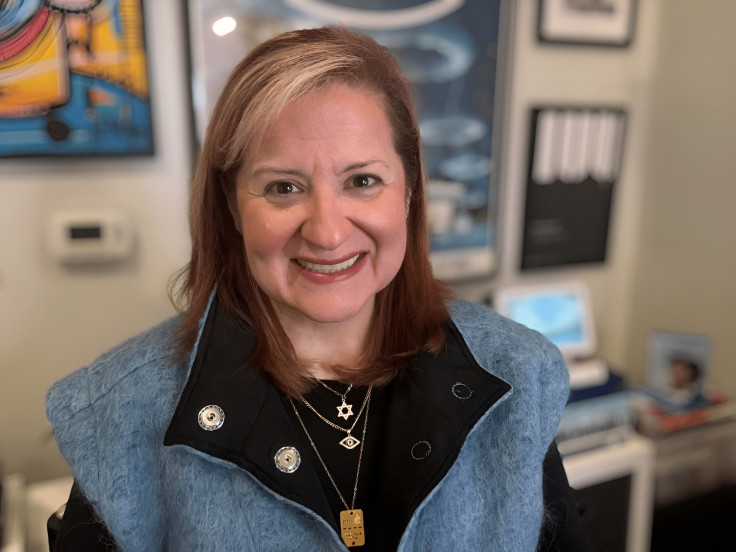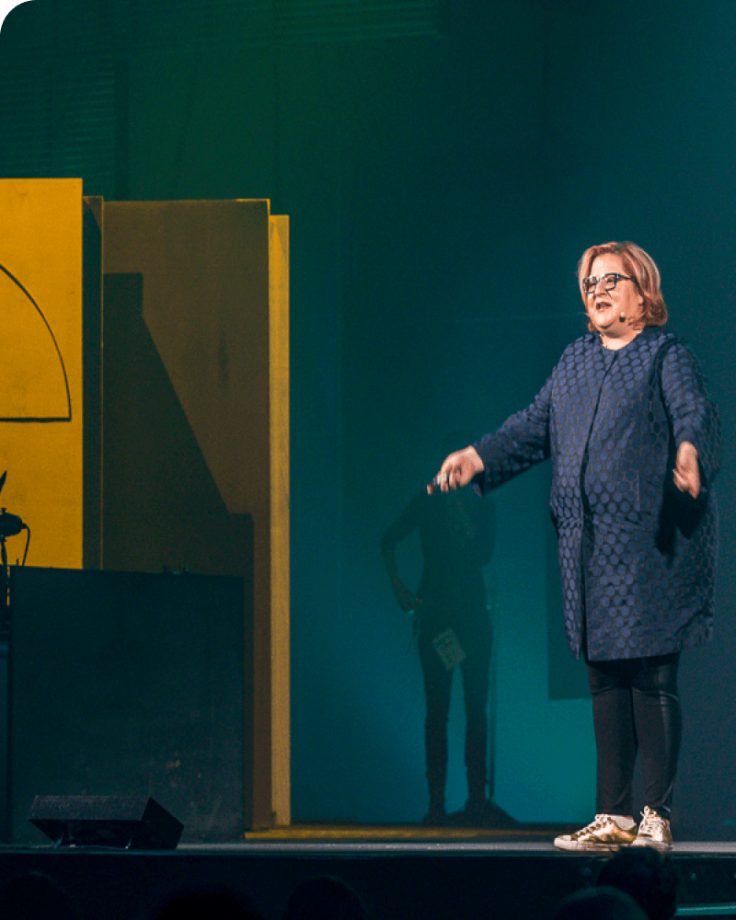
Joanna Peña-Bickley says that "any story is possible in the right space and time." She is referring to her own life, growing up in a Mexican-American household in Texas during the 70s and 80s, amid the computer revolution, space exploration, and women's societal progress.
How else, without that belief, could she have gone on to invent some of the most innovative technologies we use today, like the first streaming video players for live news, or new A.I.-powered Alexa devices?
Long before being known as the mother of Cognitive Experience Design and a pioneer in generative A.I.; and before being named one of Fortune's 2020 Most Powerful Women or a 2022 Hispanic Star, she says two women were a huge influence for her.
First, as a Star Trek fan, there was Lieutenant Uhura, played by Nichelle Nichols, who was one of the first women of color in a leading role on television at the time. "As a communications officer, she had this remarkable little earbud that could allow her to understand every language in the universe, to decode the vibrations of the universe to help make decisions. And to me, that was the coolest thing. And I could imagine a world like it was. Star Trek showed me a hopeful future"
"I actually grew up dyslexic, and I had a lot of trouble reading, so I did not do well in school. But then, I would be an early adopter of some of the A.I. solutions that today have become really popular. Because, in order for me to write really good papers and, like, reread them back to myself, I was already using things like speech to text and text to speech in my everyday work," Peña-Bickley explained.
Her biggest inspiration, however, stems from her mother, a self-made entrepreneur and architecture designer who built a solid career in San Antonio. "My great-grandmother immigrated to the United States as a young child during the Mexican Revolution in the early 1900s and started with nothing here in this country as farm workers. But I, as a fourth-generation Latina, had the luxury of growing up with a mom who always inspired me."
"Some people say Latino culture is a patriarchy. And I say 'not in my world.' I had the matriarchy. I had some of the strongest female leaders in my life. And because of where they came from and what they saw, though they didn't ever say it because they didn't romanticize the struggle, I could see that anything was possible."

Promoting STEAMD (science, technology, engineering, the arts, and mathematics) education for women and girls in the U.S., and in order to invite more Latinas and women to involve themselves in careers in technology, Peña-Bickley founded the AI Design Corps, which she hopes will ensure "a workforce that is innovative, resilient, and prepared to lead in a rapidly evolving global landscape."
The following interview, made a few days before Peña-Bickley's speech at the Latinas in Tech Summit, has been edited for length and clarity.
How has being Latina influenced you in your career?
I've always been outwardly Latina. I carry my mother's surname because even after I was married, it was that important to me to have my grandmother and my mother's legacy and their success, those shoulders that I stand on, to be the foundation that I got through. And though I'm light-skinned and was afforded privileges that my dark-skinned Latina sister, who has more indigenous features, might not have had, when I left Texas—which, let's not forget, was once part of Mexico—I used to cry all the time. Why don't I look like everybody else?
"No te llores," my grandma used to say (don't cry, in Spanish). "Because what you don't realize is that those are going to be strengths that you have, and that you will then have a responsibility to bring our community with you."
As a kid, it was hard to understand. But when I was in my 20s, I realized, "Oh, I am in rooms that my mother and grandmother never got a chance to be in." And I do have to bring the voice of our community in a way that demonstrates excellence all the time. However, in order to get Latinas into this space, a challenge was there weren't a lot of us interested in.
Why do you think that technology hasn't been a career field pursued by Latinas?
Because Latinos, we teach our kids that they can be engineers or lawyers or doctors, but we tell them, "Don't fail us." And that is a high bar for anyone in our culture. We know that our families mean the world to us. And if you're a first-generation Latino born in this country, you're going to follow the path that makes your parents happy and feels safer. Because you see them working so hard, and you know that they have to make immense sacrifices to be able to afford to send their kids to college. And so do you want your kids in a field that feels risky? And technology still feels risky to so many in our community.
Do you think the education programs available are enough to promote the inclusion of Latinas?
We still do not have enough Latinas in this role, and sadly our educational system isn't inviting to all of us. And I actually think the conversation we're having right now about AI is going backwards. The numbers show we are on a forward trajectory as women and then as Latinas in every field, but regarding AI as a society we're still having a conversation of whether AI is either the best thing since sliced bread or it's going to end the world and nobody's going to have jobs, right? There is not a conversation in the middle.
AI has transformed 1.1 billion jobs already, and according to the World Economic Forum, in the next two years, we have to upskill 50% of our workforce to adapt. And the thing is you don't need a PhD to be in this space and to make a living, but those conversations aren't being had. And it is having a chilling effect. And what's happening is Latinas go, "Oh I don't. That's inequitable. So I'm not going to get in the game."
Well guess what? AI is like a person. It's a child. Alexa today is ten years old. And if we don't get enough Latinas to be Alexa's mom, because Alexa has a lot of moms, then we're going to be in real trouble and we're going to be left out of this revolution and we're going to be set back.

So the work and so much of the mission that I spend my time in today beyond building amazing new technologies in the area of AI, is ensuring that we have the workforce that is cycling in, people from communities that don't look like us, because AI is a reflection of us. AI reflects all of our biases and all of our ingenuity. But without more Latinas in it, it will not reflect us, and we will not be able to get the fruits of something that is not a tool.
How do you work to change that?
That's why I co-founded the AI Design Corps with my own children and family. Because we have to bring more minorities into the space. The AI design course aims to bring hands on AI literacy to our communities, in a manner that makes it acceptable, approachable, and gives people the path because you got to meet people where they're at.
We're going through the biggest societal transformation we have ever seen in our lifetimes, not just lifetimes. As human beings, we have created so many tools that are smart. But Humanity's best innovation isn't fire and the wheel. We've actually given birth to a new species of computers that can think and learn like us. And so when you're able to create something that special, we need more people and representation in it so the world can use it to do and solve the real challenges that are in front of us.
In a time when we think about the importance of women in our lives and their freedoms and things like that, particularly here in the States, this technology can help transform us to be more free and more present and more intelligent. Rather than fearing it, we have to look and say, "how do we work with it in a way that enables us to be the very best version of ourselves?"
I think about my indigenous ancestors from Mexico.And they lived, by the way, to the fact that we're 100 years old and now my generation is going to live to be 120. I want to live that life with dignity. And if a computer can help me live and be more present in the lives of my children, my grandchildren, and my community, why wouldn't I do those things?
© 2024 Latin Times. All rights reserved. Do not reproduce without permission.







